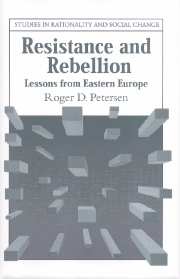Book contents
- Frontmatter
- Contents
- LIST OF FIGURES AND TABLES
- PREFACE
- 1 Introduction
- 2 Mechanisms and Process
- 3 Lithuania, 1940–1941
- 4 Rebellion in an Urban Community: The Role of Leadership and Centralization
- 5 The German Occupation of Lithuania
- 6 Postwar Lithuania
- 7 More Cases, More Comparisons
- 8 Resistance in the Perestroika Period
- 9 Fanatics and First Actors
- 10 Conclusions
- BIBLIOGRAPHY
- INDEX
1 - Introduction
Published online by Cambridge University Press: 04 December 2009
- Frontmatter
- Contents
- LIST OF FIGURES AND TABLES
- PREFACE
- 1 Introduction
- 2 Mechanisms and Process
- 3 Lithuania, 1940–1941
- 4 Rebellion in an Urban Community: The Role of Leadership and Centralization
- 5 The German Occupation of Lithuania
- 6 Postwar Lithuania
- 7 More Cases, More Comparisons
- 8 Resistance in the Perestroika Period
- 9 Fanatics and First Actors
- 10 Conclusions
- BIBLIOGRAPHY
- INDEX
Summary
This book is about ordinary people and the roles they come to play during times of rebellion and resistance against powerful regimes. How is violence against such regimes organized and sustained? How and why do individuals accept enormous risks in the process? On one hand, the subject matter is violence and killing. On the other hand, the subject matter is friendship groups, farming practices, religious and cultural norms – the stuff of the most basic social interactions of everyday life. Whether individuals come to act as rebels or collaborators, killers or victims, heroes or cowards during times of upheaval is largely determined by the nature of their everyday economic, social, and political life, both in the time of the upheaval and the period prior to it. The extraordinary is inextricably linked to the ordinary.
As the reader will discover, this book provides a very detailed theoretical treatment of the process that pushes and pulls individuals into rebellion. Among the most important issues, the work specifies how different social structures tend to change strategic frames and trigger varying sets of causal mechanisms. The book illustrates how variation in community size, homogeneity, and centralization may affect the existence and operation of norms; it examines the role and structural position of “first actors” or entrepreneurs in initiating and sustaining collective action through norms and use of threats; it attempts to identify the conditions when one type of mechanism (rational, normative, irrational) is most likely to prevail over another type of mechanism.
- Type
- Chapter
- Information
- Resistance and RebellionLessons from Eastern Europe, pp. 1 - 31Publisher: Cambridge University PressPrint publication year: 2001

